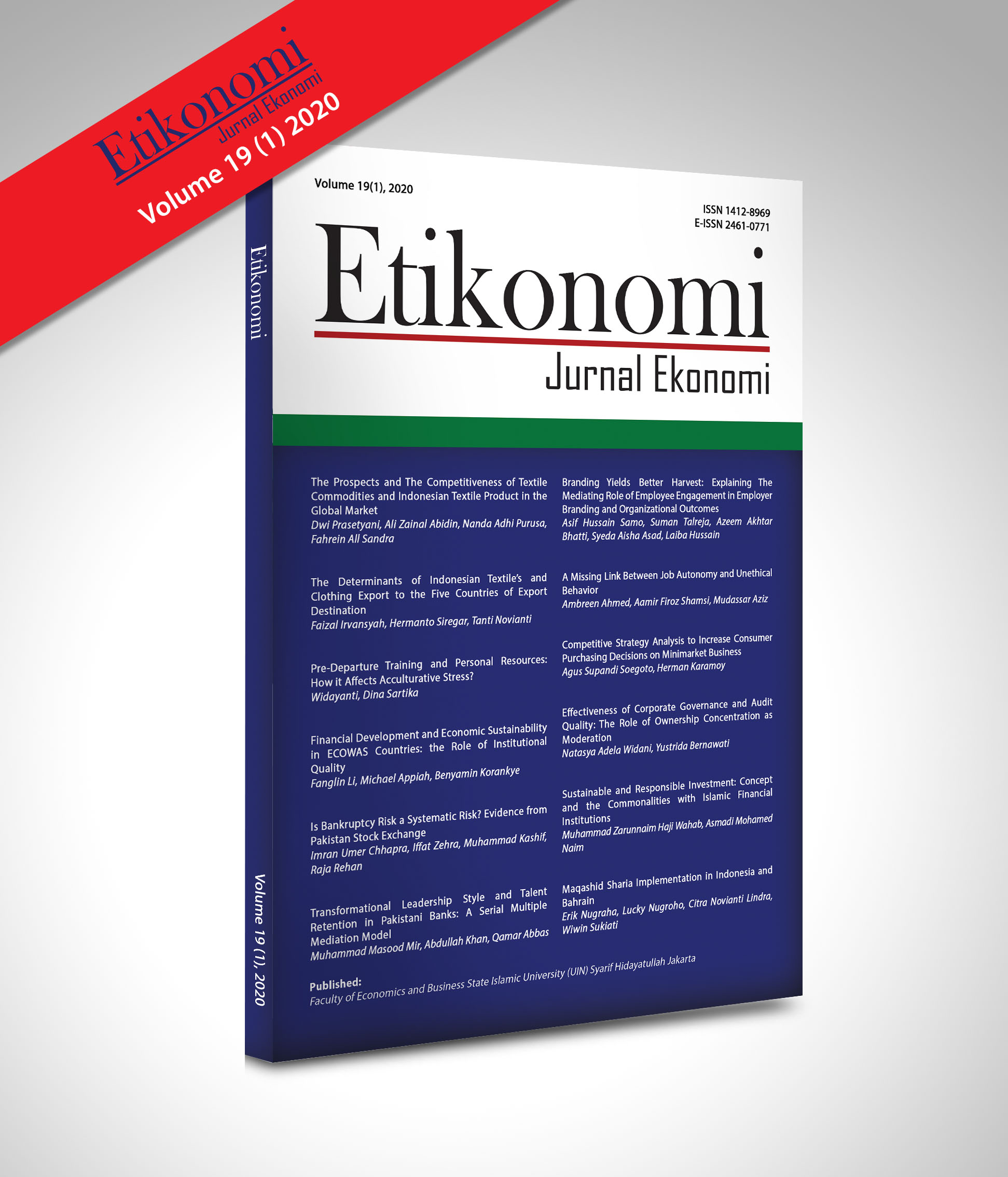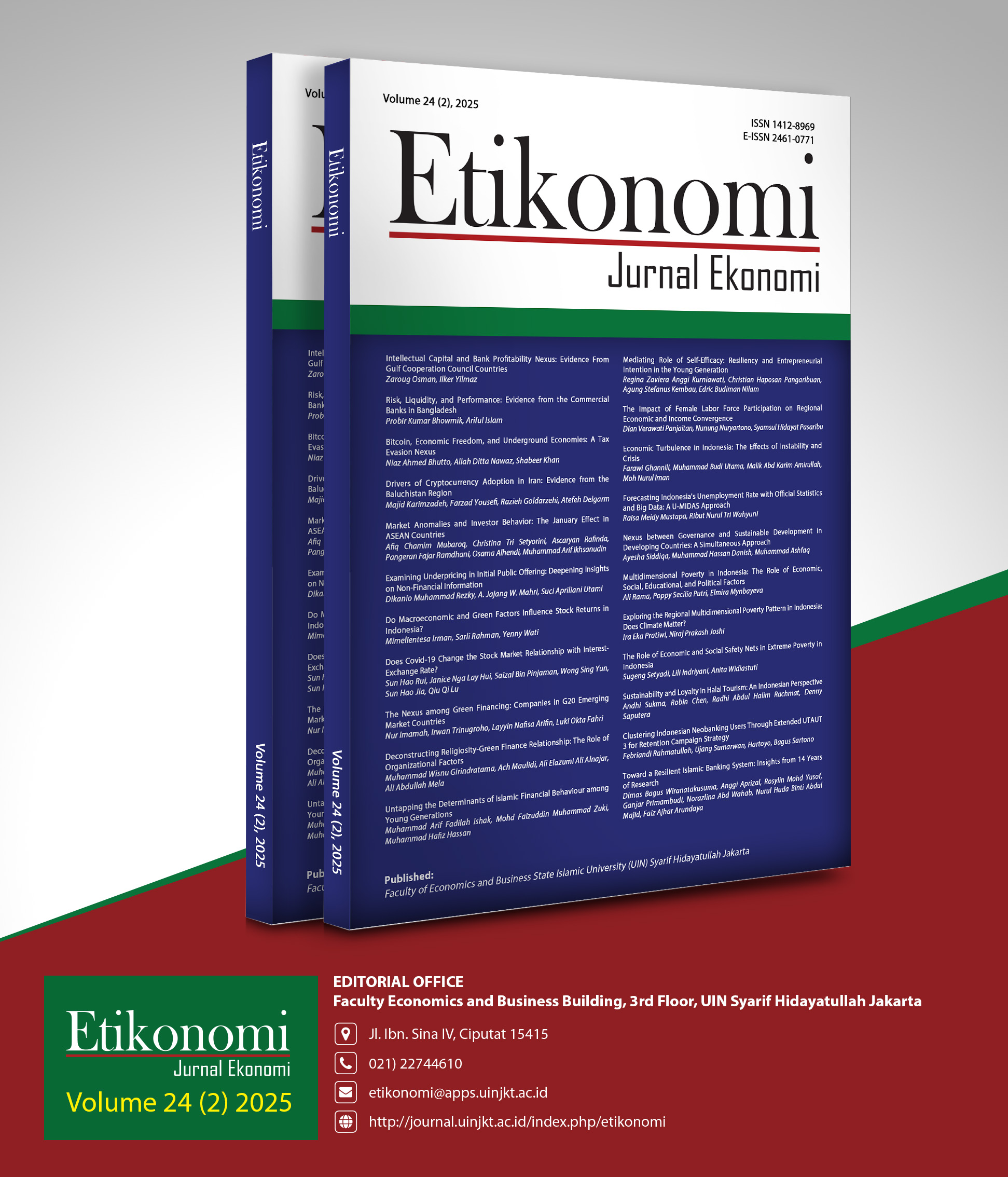Pre-Departure Training and Personal Resources: How it Affects Acculturative Stress?
DOI:
https://doi.org/10.15408/etk.v19i1.11884Keywords:
pre-departure training, acculturative stress, personal resources, migrant workersAbstract
One of the efforts made by the government to reduce the unemployment rate in Indonesia is by conducting an overseas apprenticeship program. As an international assignment, this apprenticeship program leads to social problems such as stress. This research seeks to examine and analyze the influence of pre-departure training on acculturative stress with personal resources as a moderating variable. The respondents of this study were 215 migrant workers from West Java. This research used process analysis to analyze data. The result shows that there is a negative influence of pre-departure training on acculturative stress. Besides that, personal resources strengthen the influence of pre-departure training on acculturative stress. The higher a level of personal resources possessed, the more it will strengthen the influence of pre-departure training on acculturative stress. These findings support the statement that personal resources are one of the leading indicators that affect an individual's performance at work.JEL Classification: M53, J61
How to Cite:
Widayanti., & Sartika, D. (2020). Pre-Departure Training and Personal Resources: How it Affects Acculturative Stress?. Etikonomi: Jurnal Ekonomi, 19(1), 31 – 40. https://doi.org/10.15408/etk.v19i1.11884.
Downloads
References
Amatea, E. S., & Fong, M. L. (1991). The Impact of Role Stressors and Personal Resources on the Stress Experience of Professional Women. Psychology of Women Quarterly, 15, 419-430. https://doi.org/10.1111/j.1471-6402.1991.tb00418.x.
Ayu, D. R., Maarif, S., & Sukmawati, A. (2015). Pengaruh Job Demands, Job Resources dan Personal Resources Terhadap Work Engagement (The Impact of Job Demand, Job Resources & Personal Resources to Work Engagement). Jurnal Aplikasi Bisnis dan Manajemen (JABM), 1 (1), 12 - 22.
Black, J. S., & Mendenhall, M. (1989). A Practical but Theory-Based Framework for Selecting Cross-Cultural Training Methods. Human Resource Management, 28 (4), 511-539. https://doi.org/10.1002/hrm.3930280406.
Fomina, N. V., Fedoseeva, T. E., Kuimova, N. N., Ivanova, I. A., Medvedeva, T. Y., & Salyaeva, E. Y. (2017). Personal Resources of the Professional’s Stress Tolerance. Asian Journal of Pharmaceutics, 11 (3), 1-5.
Granskaya, J., & Lizhenkova, E. (2015). Сoping with Stress in Migrant Workers. Psychology and Law, 5 (4), 106-126.
Güler, M., & Çetin, F. (2018). The Relationship Between Personal Resources and Well-being: The Role of Resource-Threatening and Resource-Consuming Factors. Management Research Review, 42(2), 199-214. https://doi.org/10.1108/MRR-01-2018-0002.
Ham, A. J., Batangan, M. T., Ignacio, R., & Wolffers, I. (2014). Toward Healthy Migration: an Exploratory Study on the Resilience of Migrant Domestic Workers from the Philippines. Transcultural Psychiatry, 51(4), 545-565.
Hatanaka, K., Tanaka, & Tomoko. (2016). Cross-Cultural Factors that Influence Adjustments of Foreign Care Workers in Japang: Towards a Three-Layered Structural Model. LIFE: International Journal of Health and Life-Sciences, 2 (3), 1-17.
Hayes, C. T., & Weathington, B. (2007). Optimism, Stress, Life Satisfaction, and Job Burnout in Restaurant Managers. The Journal of Psychology Interdisciplinary and Applied, 141(6), 565 - 579.
Hurn, B. J. (2007). Pre-departure Training for International Business Managers. Industrial and Commercial Training, 39(1), 9-17.
Kinkawa, M., Hapsari, E. D., Ueda, M., & Matsuo, H. (2012). Current Situation and Challenges in Employment of Indonesian Nursing/Certified Care Worker Candidates Based on Economic Partnership Agreement Between Indonesia and Japan. Bulletin of Health Science, 28, 31 - 40.
Kirana, R. P. (2013). Strategi Adaptasi Pekerja Jepang Terhadap Culture Shock: Studi Kasus Terhadap Pekerja Jepang di Instansi Pemerintah di Surabaya (Adaptation Strategy of Japanese Workers Against Culture Shock: Case Study of Japanese Workers in Government Agencies in Surabaya). Japanology, 1(1), 1-11.
Kotze, M. (2018). How Job Resources and Personal Resources Influence Work Engagement and Burnout. African Journal of Economic and Management Studies, 9(2), 148-164.
Kvist, A. V. (2012). Immigrant Groups, Vocational Training, and Employment. European Journal of Training and Development, 36(8), 809-826. https://doi.org/10.1108/ 03090591211263530
Mielniczuk, E., & Laguna, M. E. (2017). Motivation and Training Initiation: Evidence From Poland. Journal of Workplace Learning, 29 (1), 1-29. https://doi.org/ 10.1108/JWL-01-2016-0002
Luthans, F. (2010). Organizational Behavior: An Evidence-Based Approach (12th ed). New York: McGraw Hill Higher Education.
Mastenbroek, N. J. (2017). The Art of Staying Engaged: The Role of Personal Resources in The Mental Well-Being of Young Veterinary Professionals. JVME, 44(1), 84-94.
Mayerl, H., Stolz, E., Großschädl, F., Rásky, É., & Freidl, W. (2017). The Moderating Role of Personal Resources in The Relationship Between Psychosocial Job Demands and Health: a Cross-Sectional Study. BMJ Open Journals, 7(8), 1-10. https://doi.org/ 10.1136/bmjopen-2016-015710.
Murali, S. B., Basit, A., & Hassan, Z. (2017). Impact of Job Stress on Employee Performance. International Journal of Accounting & Business Management, 5(2), 13-33.
Nugraha, S., Honda, S., & Hirano, Y. (2017). The Change in Mental Health Status of Indonesian Health Care Migrant Worker in Japan. Kesmas: National Public Health Journal, 12 (2), 53-59.
Rosida, A. (2018). Analysis of Culture Shock Experienced Towards Indonesian Sailors in Overseas. IOP Conference Series: Earth and Environmental Science, 156, 1-7.
Selmer, J. (1999). Culture Shock in China? Adjustment Pattern of Western Expatriate Business Managers. International Business Review, 8(5-6), 515-534. https://doi.org/ 10.1016/S0969-5931(99)00018-9.
Setyowati, S. H., Yetti, K., Hirano, Y. O., & Kawaguchi, Y. (2010). The Experiences of Indonesian Nurses in Japan Who Face Job and Cultural Stress in Their Work: a Qualitative Study. Bulletin of Kyushu University Asia Center, 5, 175-181. https://doi.org/10.15017/17936.
Shuttleworth, A. (2004). Managing Workplace Stress: How Training Can Help. Industrial and Commercial Training, 36(2), 61 - 65. https://doi.org/10.1108/00197850410524824.
Treven, S. (2003). International Training: The Training of Managers for Assignment Abroad. Education + Training, 45 (8/9), 550-557. https://doi.org/10.1108/ 00400910310508937.
Xanthopoulou, D., Bakker, A. B., Demerouti, E., & Schaufeli, W. B. (2007). The Role of Personal Resources in the Job Demands-Resources Model. International Journal of Stress Management, 14 (2), 121-141.
Xia, J. (2009). Analysis of Impact of Culture Shock on Individual Psychology. International Journal of Psychological Studies, 1(2), 97-101.
Ward, C., Bochner, S., & Furnham, A. (2005). The Psychology of Culture Shock (Second ed.). Philadelphia: Routledge.
Wong, D. F., & Song, H. X. (2008). The Resilience of Migrant Workers in Shanghai China: The Roles of Migration Stress and Meaning of Migration. International Journal of Social Psychiatry, 54 (2), 131–143. https://doi.org/10.1177/0020764007083877.
Zheng, C., Hyland, P., & Soosay, C. (2007). Training Practices of Multinational Companies in Asia. Journal of European Industrial Training, 31(6), 472-494. https://doi.org/ 10.1108/03090590710772659.














